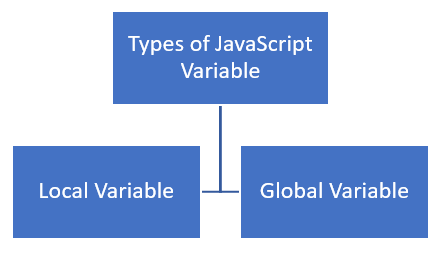JavaScript Variable
Variables are used to store data temporary in the memory. Variable can have any type of value i.e. number, string, boolean, date etc. The data stored in these variables can be changed in between the execution of the program. Variable name can be much longer but for convenient kept it short, easy and with descriptive name.
Rules to declare a variable name:
- You can use letters uppercase 'A-Z', lowercase 'a-z', digits '0-9', underscore '_' and dollar '$'
- Cannot begin with a digit
- No reserved words or keywords are used.
- Variable names are case sensitive. eg: age and AGE are different variables.

To declare a variable name, in JavaScript, camelCase is commonly used, each letter of every words except first word starts with a capital letter. eg: veryVeryLongVariable.
Example: Some Valid variable name: FirstName, firstname, first_name, Name1, _ , $
Example: Some Invalid variable name: 1Name, switch, if, First Name, user-name
JavaScript allow us to use a variable without declaring it. eg:
a=10; console.log(a); // 10
Above code is used without 'strict' hence no error, but in 'use strict' mode above code will give error.
"use strict"; a = 10; // error: a is not defined
Therefore, it is recommended that you must declare a variable before using it.
Variable Declaration
To declare a variable in JavaScript, use the let, var, const keyword. For example:
let username; //variable declaration username='AnkitWebLogic'; //value assignment console.log(username); //display value

To declare multiple variables in one line, use the following syntax:
let student_name='Ankit', course='Web Development', percentage=99.99
let is a modern way to declare a variable whereas var is an old way.
Difference between var & let
<script>
let a="Hi";
let a="Hi again"; // error - 'a' already declared
document.write(a); // no output
</script><script>
var a="Hi";
var a="Hi again"; // no error
document.write(a); // Hi again
</script>
Constant Variable Declaration
Constant variable are those variables whose value cannot be changed during the execution of the script. To declare a constant variable, const keyword is used. Syntax: const AADHAR_NUM=12345678910123456. It is recommended that use capital letter to declare constant variable, to distinguish between normal variable and a constant variable.
<script>
const PI=3.1415;
PI=5.5; //error, cannot be changed
console.log(PI);
</script>
JavaScript Variable Scope
Variable scope tells the user that where a variable can be used. JavaScript variable is of 2 types: Local and Global.
Local Variable
The variable declared inside a function has a local scope, it cannot be access outside that function.
<body>
<h2>JavaScript Scope</h2>
<p id="demo1"></p>
<p id="demo2"></p>
<script>
exLocalVariable(); //function call
function exLocalVariable() {
let interest = "Computer Games"; //local variable declaration
demo1.innerHTML='Type:'+ typeof interest +" Value:"+ interest;
}
demo2.innerHTML = 'Type:' + typeof interest;
</script>
</body>

Global Variable
The variable declared outside a function has a global scope, it can be access in other functions.
<body>
<h2>JavaScript Scope</h2>
<p id="demo1"></p>
<p id="demo2"></p>
<script>
let interest = "Computer Games"; //global variable declaration
exLocalVariable(); //function call
function exLocalVariable() {
demo1.innerHTML = 'Inside Function: Type:' + typeof interest + " Value:" + interest;
}
demo2.innerHTML = 'Outside Function: Type:' + typeof interest + " Value:" + interest;
</script>
</body>
Ad:

